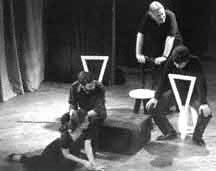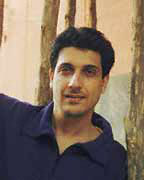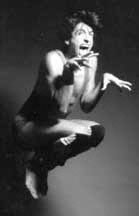- Home
- Archive -May 1999
- Catharsis and e. . .

Catharsis and ecstasy
- In :
- Others
By Anupama Bhattacharya
May 1999
Theater and dance are two of the major performing arts. And both have a deeper, more therapeutic and spiritual import that was first highlighted in the ancient texts of Bharat Muni’s Natya Shastra and Aristotle’s Poetics. Over centuries, as dance and drama developed, from court theater and fertility foot-tapping through convention-defying group theater and jazz to the subtleties of method-acting and contemporary dance, the two have flowered to encompass all complexities of human psychology.
A unique double-interview with experts from both dance and theater sheds more light on how the two forms can help improve your life. While Indian theater guru Barry John discusses educative and psycho-therapeutic angles of theater with Gaurav Raina, ace choreographer Shiamak Davar speaks with Anupama Bhattacharya about how he uses dance as a form of therapy for channeling energies.
BARRY JOHN
 |
What is unique to drama compared to other fine arts?
Theater is a social endeavor. Fine arts, such as painting and sculpture, are solitary pursuits.Theater has more in common with sport—it requires a collective team effort where each participant has an assigned role. It also represents a synthesis of other arts—music, painting, writing and dance.
What is theater’s creative scope vis-a-vis cinema?
Films are a recent development. But theater is as old as civilization and is found in all cultures. In fact, the roots of drama are religious. It was a sacred part of the community, the entire belief system. Cinema is the result of a variety of deceptions—technological and otherwise. There is a lot of earnest preparation and rehearsal in theater, with respect for detail. In a play you are able to visualize the entire story and thus pitch your performance. In cinema, the continuity is broken as scenes are not enacted in the same sequence as the script.
How does drama enrich human relationships?
Most people, especially the young, enjoy theater because despite being practical and physical, it also involves emotions and feelings. Positive education in relationships is essential to enable people to handle responsibilities and understand others. Drama teaches a person to be sensitive to others, to be more refined in verbal communication. You learn to work with others and accept criticism.
Can an actor keep himself apart from his character without diluting the intensity of identification?
Ideally, an actor must be at least 10 per cent separate from his character to remain in touch with reality.
 |
It is important to know where to draw the line because it is practically impossible to be completely submerged into the personality of your character. At the same time, it is an immensely deep learning experience to be somebody else. For example, Ben Kingsley went to great lengths to be Gandhi for Richard Attenborough’s film. Even when he would stay overnight in a hotel during a shoot, he would remove all the furniture from the room, sleep on the floor, wear a dhoti and stick to a vegetarian diet. However, this method-acting approach can become disturbing when a negative character such as a murderer or a rapist has to be played. But even here, to be able to identify with the character and yet remain abstracted can be a challenging experience.
Can theater help manage psychological problems?
Definitely. Theater as a form of therapy can be sheer magic. In psychodrama, for example, we encourage a distressed person to tell his story. The effect is extremely cathartic. Then, the person is made to act it out step by step and develop the courage to perform the reasons for his problems—why he failed his exams or gave up his job. In the process, the person analyses his problem, and even directs others to act his part. When you see yourself being played by others, you can visualize yourself objectively.
Do you recommend dramatics for schools?
Drama makes us realize that we are not a uniform species. Solutions to problems are not necessarily right or wrong. Nothing in life is black and white. The performing arts appreciate the child’s individuality. Drama is interested in you the person. It encourages you to be creative, to make your own choices. Theater is about empowerment, and it empowers you for life.
Can theater educate and entertain at the same time?
A good play teaches you how to live. Why do we gossip, listen to news, or watch jealous lovers? We all have an innate curiosity. Theater gives you a peep into other lives and can provide valuable moral instruction. Every minute of our life, we are acting. Consciously or unconsciously, we modify our language, attitudes, gestures and expressions depending on who we are dealing with. Actually, the only difference between everyday life and theater is that formal acting is public.Acting and direction require self-observation and observation of others. An actor needs to know what is happening inside him emotionally, and then be in control of it. This mastery can even be extended to daily life.
How did theater help develop your personality?
I have always found it a privilege to be an actor. The work has incorporated almost all my interests. I usually designed my own plays and shifted from acting to set designing to direction and finally to training actors. I even ventured beyond theater and applied it to social work. Theater is a dynamic field. Every new play introduces you to a new self. There is complete transformation and an entirely new world of thinking and behaving opens up. Theater also helps you develop an insight into human nature. Yet, it never gets clinical. I am able to perceive people at another level. In a sense, the art of acting makes you a little clairvoyant.
SHIAMAK DAVAR
How do you relate to your spiritual in clinations as a dancer?
 |
For me, dancing is a way of life. I believe in God, the cosmic balance and balance of nature, astral energies. I also believe that life itself is a stage, a preparation for something better. But you can’t do anything unless your body, mind and spirit are healthy. Which is where dance comes in. It is a great therapy.
But how does it heal?
It’s not just dance. Whether you walk, run or swim, the most important thing is body as a release factor. If you are sad, tears come out, if you laugh, your stomach moves, when you are terrified, your body shakes. The mind has its external manifestations. If you have anything negative inside you, if you’re feeling angry, jealous, sad, depressed—the body reacts and you get headaches, body aches. So even if you are feeling down in the dumps, it helps to go out, cycle, jog, walk or dance. Today there is a lot of negativity in the air. The world is going through a major crisis and the energies are getting chaotic. Whatever positive energy each one of us can add counts. There are many things around us that don’t fall into our limited framework of thought and preconceived notions. So we reject them outright. Once, I saw a UFO…
A UFO?
Difficult to believe, but it’s true. That was in Bombay. But nobody would believe me when I talked about it. Everybody rejected it as a schoolboy’s imagination. I believe in aliens. They are here to help earthlings. But we have to be prepared to receive them.
Can dance be used for relaxation?
Absolutely. When you dance, two things happen. One is you learn an art form—which is most important, since it provides an outlet to your creativity. The other thing is the fitness factor. Without fitness you cannot dance. Unless the body is in shape, you cannot have good coordination. Dancing gives you the freedom of movement.
How would you define your dance?
I try to do a lot of things. I use jazz, chhau (an Indian tribal dance form), Sufi, modern, ballet, and I have my own style. It is basically an amalgamation of various positive steps. People know when they see my choreography that it is a Shiamak step. I’m doing what I feel movement should look like.
How do dance forms affect us?
As far as I am concerned, dance is dance. It doesn’t matter whether you move your head this way or that or shake a leg left or right. A hip movement is a hip movement. You can call it western, Indian or ballet. But if you are a good dancer, you will imbibe everything. See, an actor can’t go on doing just happy roles. He also has to do a lot of sad roles to be a complete actor. And each of these roles hone your perception of the human psyche.
But there must be a difference somewhere…
In jazz, the movement is outward flowing. In ballet it’s more controlled energy and leg-oriented work. Jazz is absolutely free, you can release a lot of energies, just like in modern dance. Ballet is more orthodox, more stereotyped. In most classical dances, there is a lot of restriction: you cannot do this, you cannot do that. That teaches discipline. In my dance, there is freedom. I use a bit of kathak (an Indian dance form), a bit of modern dance and fuse them to create the best release factor.
 |
How do you use dance as a release factor?
There are many unhappy people in the world, especially children. And if you don’t give them guidelines from the beginning, they start having what you call the ripple effect. Children and teenagers have an immense store of energies which they often release into destructive channels such as drugs, sex and rock ‘n’ roll. The negativity they release in the process affects others who further release more negativity in the world. What we must do is help them properly channel their energies whilst they are still young and impressionable into an art form.
Should schools incorporate dancing into their curriculum?
Definitely. Outside India, many schools are already using these techniques to channel energies. They teach music so children can understand maths. When you learn music, you learn adding, subtracting. When you make people do something they are interested in, then they are focused on it.
Does dancing help in your quest for the Self?
It is only when you experience pain that you understand the true meaning of happiness. To mould steel, you have to put it through fire. That’s where the right channeling of energies comes in. Dancing hones your body, disciplines your mind and sharpens your aesthetic sense. Each one of us is born with a purpose. My mission is to help people through dance and I always try to fulfill that.
To read more such articles on personal growth, inspirations and positivity, subscribe to our digital magazine at subscribe here
Life Positive follows a stringent review publishing mechanism. Every review received undergoes -
- 1. A mobile number and email ID verification check
- 2. Analysis by our seeker happiness team to double check for authenticity
- 3. Cross-checking, if required, by speaking to the seeker posting the review
Only after we're satisfied about the authenticity of a review is it allowed to go live on our website
Our award winning customer care team is available from 9 a.m to 9 p.m everyday
The Life Positive seal of trust implies:-
-
Standards guarantee:
All our healers and therapists undergo training and/or certification from authorized bodies before becoming professionals. They have a minimum professional experience of one year
-
Genuineness guarantee:
All our healers and therapists are genuinely passionate about doing service. They do their very best to help seekers (patients) live better lives.
-
Payment security:
All payments made to our healers are secure up to the point wherein if any session is paid for, it will be honoured dutifully and delivered promptly
-
Anonymity guarantee:
Every seekers (patients) details will always remain 100% confidential and will never be disclosed
